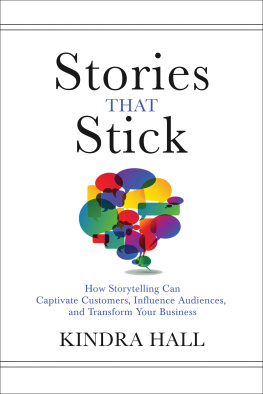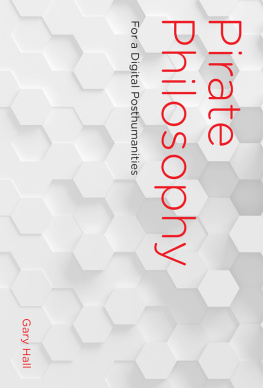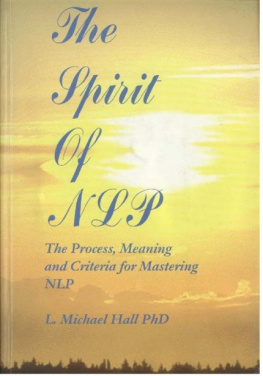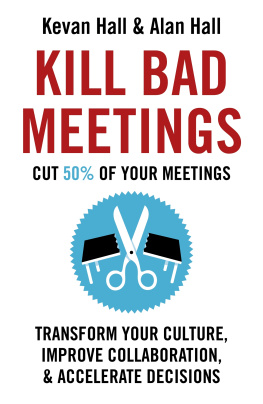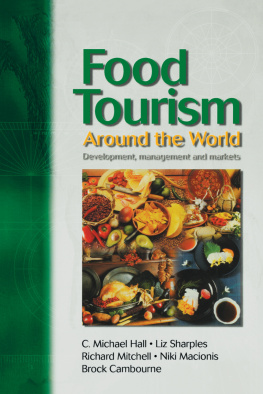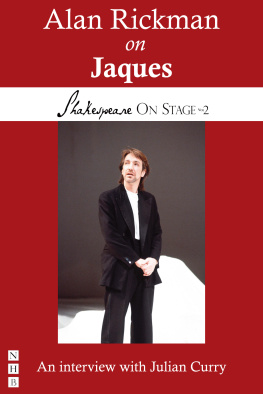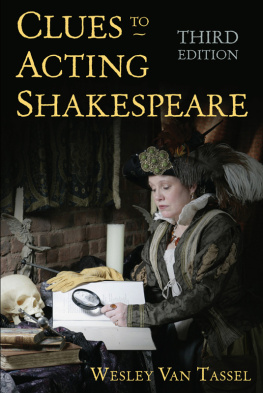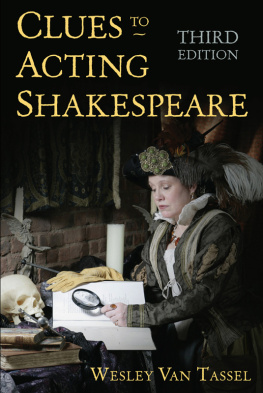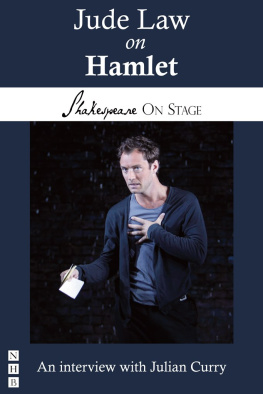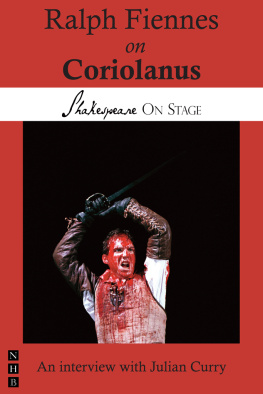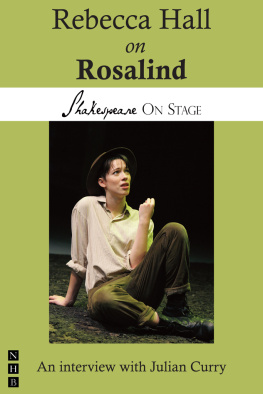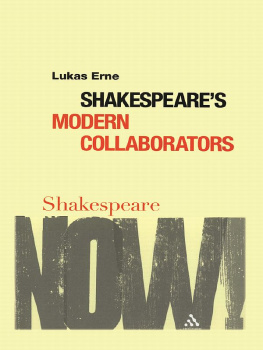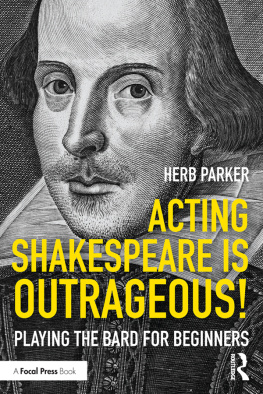SHAKESPEARES
ADVICE TO
THE PLAYERS

Shakespeares Advice to the Players first published in 2003
by Oberon Books Ltd
Paperback edition first published 2004
Trade edition first published 2009
This electronic edition published in 2012 by Oberon Books Ltd
521 Caledonian Road, London N7 9RH
Tel: +44 (0) 20 7607 3637 / Fax: +44 (0) 20 7607 3629
e-mail: info@oberonbooks.com
www.oberonbooks.com
Copyright Peter Hall 2003, 2009
Peter Hall is hereby identified as author of this work in accordance with section 77 of the Copyright, Designs and Patents Act 1988. The author has asserted his moral rights.
You may not copy, store, distribute, transmit, reproduce or otherwise make available this publication (or any part of it) in any form, or by any means (electronic, digital, optical, mechanical, photocopying, recording or otherwise), without the prior written permission of the publisher. Any person who does any unauthorized act in relation to this publication may be liable to criminal prosecution and civil claims for damages.
A catalogue record for this book is available from the British Library.
MOBIPOCKET ISBN 978-1-84943-339-6
EPUB ISBN 978-1-84943-355-6
Cover photograph of Peter Hall by Nobby Clark
Visit www.oberonbooks.com to read more about all our books and to buy them. You will also find features, author interviews and news of any author events, and you can sign up for e-newsletters so that youre always first to hear about our new releases.
This book is dedicated to the memory of George Rylands and of F R Leavis;
also to John Barton, for fifty years my friend and colleague
ACKNOWLEDGEMENTS
In my fifty years as a director, I have worked on Shakespeares text with hundreds of actors, from the greats Ashcroft, Dench, Evans, Gielgud, Olivier, Richardson, Scofield to the beginners who were learning about verse and prose as they rehearsed the plays. I learned from them all, and I thank them all.
Many books have helped me, in particular The Oxford Shakespeare edited by Stanley Wells and Gary Taylor; David and Ben Crystals book Shakespeares Words; and Shakespeares Lives by S Schoenbaum.
I am grateful for the support of James Hogan and his colleagues at Oberon Books.
I must particularly thank Roger Warren who cast an enthusiastic eye over the manuscript. More importantly, he prepared the Shakespeare extracts with minimum punctuation, a task he has performed for me on many stage productions.
Finally, I would like to thank Maggie Sedwards; without her assistance this book would not exist.
PART ONE
PROLOGUE
Can we mount an authentic performance as Shakespeare would have seen it? No. Authenticity in the performing arts is ultimately impossible. We cannot perform anything, be it dance, music or drama, with any certainty either that we are performing in the right style (we are different people, with different attitudes and different sensibilities) or that we will understand even in approximately the same way as the original spectators.
The Shakespeare problem is particularly sensitive. Our language has changed, our accents have altered and our religious, political and social preoccupations have been transformed in the last 400 years. We are literally different people, in scale, appetite and morality.
In another 200 or so years, Shakespeare will only be faintly visible rather as Chaucer is to us. Language must change or die. And Shakespeares language will not always be readily comprehensible; he will soon need translating. A book like this will then be useless, because with the disappearance of the original words goes the disappearance of the form. It is also why translated Shakespeare is so much modified, if not simplified.
But for the moment we can pursue in Shakespeare (as we can in performing Baroque music) a creative compromise. If we understand the authors formal demands, we have some chance of representing them in modern terms. Of course performance fashions change; they must, in order to keep up with the subtle alterations in the audiences sensibilities. But an iambic beat is still an iambic beat; a legato phrase in Mozart is still a legato phrase. The speech doesnt need sentimental Victorian booming, or the music string-playing with a 19th century vibrato. The modern equivalent can be found providing we honour every part of the original that still speaks to us. What 2003 means by trippingly on the tongue (which is to Hamlets taste in his advice to the players) will become something very different by 2053. But it should still trip.
Nonetheless, there are major difficulties. I have done many productions of Shakespeare where the verse speaking has been highly praised by some critics and roundly condemned by others. Someone must have been wrong. The reason for these contradictions is that there are no accepted standards of verse speaking and not much agreement on the old rhetorical forms. Some people like emotional Shakespeare which is almost sung; some dont. Those who like the singing often think it is poetic. I like wit and restraint, and I believe Shakespeare liked them too. Hamlet again:
Speak the speech I pray you as I pronounced it to you, trippingly on the tongue; but if you mouth it as many of your players do, I had as lief the town crier had spoke my lines.
Today, rhetoric is not trusted. It is no longer taught in schools, nor do most of us listen to its rhythms in a Sunday morning sermon. This is partly why there are no longer any accepted standards for verse speaking. Well-spoken productions dont usually get commented on: they are just thought of as good. It is the productions which dont communicate whose verse gets every kind of comment from the tolerant to the critical. I once read a critic who condemned an actor for his appalling verse speaking as Shylock in the Tubal scene. Clearly nobody had pointed out to him that in this scene Shylock and Tubal speak entirely in prose. The rhythm should be different.
In our society, to be rhetorical is a term of abuse. A hundred years ago a politician would depend on rhetoric in his public speeches in order to stress his points. He would use repetitions, balanced answering phrases and antitheses. It was his way of defining a clear and formal argument. Today politicians want to be seen on television, chatting away like any other man in the street, with as many you knows and reallys as they can muster. Informality is thought to be honest; formality is considered artificial and untrustworthy.
But if Shakespeares form is observed, an audience is still held; if it is not observed, the audiences attention strays and strays very quickly. So Shakespeare lives. And if an actor understands a speech and expresses its meaning through the form, the audience will understand also, even if they might not understand if they read the speech through once to themselves.
These are difficult times for the classical actor because there is little technical consistency. I have worked in a theatre where the director before me urged the actors to run on from one line to the next, speak the text like prose, and to take breaths whenever they felt like it. He wanted them, he said, to be real. They were; but they werent comprehensible. I then arrived and said just the opposite that the line structure was the main instrument of communication. Its five beats made up a phrase which was by and large as much as an audience could take in without a sense break.
In the past it was hardly necessary to train actors to speak verse. They had all of them been marinated in so much Shakespeare during their early years in regional theatres or on classical tours that the rhythm came naturally to them. It played in their heads all the time like an insistent backing group. Young actors are now exposed to little Shakespeare because most regional theatres cannot afford to do plays that require more than a dozen actors. And drama schools spend little time training young actors in Shakespeare because they know it is unlikely to be used in the professional theatre. Only a small percentage of actors will ever actually
Next page

